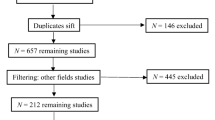Abstract
For many, the concept of videogame addiction seems far-fetched, particularly if their concepts and definitions of addiction involve the taking of drugs. This paper overviews the small, but growing area of videogame addiction and then examines the treatment options available for those affected by excessive videogame playing. An overview of the available empirical literature appears to indicate that adverse effects are likely to affect only a relatively small subgroup of players and that frequent players are the most at-risk for developing problems. Worldwide, there are relatively few practitioners that specialise in the treatment of videogame addiction and this may be because there are so few players who are genuinely addicted to playing videogames. However, the Internet may be facilitating excessive online game playing as evidenced by the increasing number of specialist addiction treatment clinics for online videogame addiction. This paper overviews the various approaches that have been used as an intervention in treating videogame addicts, including online support groups, 12-step programmes, behavioural and cognitive-behavioural therapies, and motivational interviewing.
Similar content being viewed by others
References
Allison, S. E., von Wahlde, L., Shockley, T., & Gabbard, G. O. (2006). The development of the self in the era of the internet and role-playing fantasy games. The American Journal of Psychiatry, 163, 381–385. doi:10.1176/appi.ajp.163.3.381.
Brasington, R. (1990). Nintendinitis. The New England Journal of Medicine, 322, 1473–1474.
Casanova, J., & Casanova, J. (1991). Nintendinitis. The Journal of Hand Surgery, 16, 181.
Chappell, D., Eatough, V. E., Davies, M. N. O., & Griffiths, M. D. (2006). EverQuest—It’s just a computer game right? An interpretative phenomenological analysis of online gaming addiction. International Journal of Mental Health and Addiction, 4, 205–216. doi:10.1007/s11469-006-9028-6.
Cleary, A. G., Mckendrick, H., & Sills, J. A. (2002). Hand-arm vibration syndrome may be associated with prolonged use of vibrating computer games. British Medical Journal, 324, 301. doi:10.1136/bmj.324.7332.301a.
Cole, H., & Griffiths, M. D. (2007). Social interactions in massively multiplayer online role-playing gamers. Cyberpsychology & Behavior, 10, 575–583. doi:10.1089/cpb.2007.9988.
Corkery, J. C. (1990). Nintendo power. American Journal of Diseases of Children, 144, 959.
De Freitas, S., & Griffiths, M. D. (2007). Online gaming as an educational tool in learning and training. British Journal of Educational Technology, 38, 536–538.
Egli, E. A., & Meyers, L. S. (1984). The role of video game playing in adolescent life: Is there a reason to be concerned? Bulletin of the Psychonomic Society, 22, 309–312.
Fisher, S. E. (1994). Identifying video game addiction in children and adolescents. Addictive Behaviors, 19, 545–553. doi:10.1016/0306-4603(94)90010-8.
Friedland, R. P., & St. John, J. N. (1984). Video-game palsy: Distal ulnar neuropathy in a video game enthusiast. The New England Journal of Medicine, 311, 58–59.
Griffiths, M. D. (1991). Amusement machine playing in childhood and adolescence: A comparative analysis of video games and fruit machines. Journal of Adolescence, 14, 53–73. doi:10.1016/0140-1971(91)90045-S.
Griffiths, M.D. (1997). Computer game playing in early adolescence. Youth and Society, 29, 223–237.
Griffiths, M. D. (2000). Does internet and computer “addiction” exist? Some case study evidence. Cyberpsychology & Behavior, 3, 211–218. doi:10.1089/109493100316067.
Griffiths, M. D. (2002a). The educational benefits of videogames. Education and Health, 20, 47–51.
Griffiths, M. D. (2002b). Gambling and gaming addictions in adolescence. Leicester: British Psychological Society/Blackwells.
Griffiths, M. D. (2003). Videogames: Advice for teachers and parents. Education and Health, 21, 48–49.
Griffiths, M.D. (2003a). The therapeutic use of videogames in childhood and adolescence. Clinical Child Psychology and Psychiatry, 8, 547–554.
Griffiths, M.D. (2003b). Videogames: Advice for teachers and parents. Education and Health, 21, 48–49.
Griffiths, M. D. (2005a). Video games and health. British Medical Journal, 331, 122–123. doi:10.1136/bmj.331.7509.122.
Griffiths, M. D. (2005b). The therapeutic value of videogames. In J. Goldstein & J. Raessens (Eds.), Handbook of computer game studies (pp. 161–171). Boston: MIT Press.
Griffiths, M. D. (2005c). Online therapy for addictive behaviors. Cyberpsychology & Behavior, 8, 555–561. doi:10.1089/cpb.2005.8.555.
Griffiths, M. D. (2005d). A “components” model of addiction within a biopsychosocial framework. Journal of Substance Use, 10, 191–197. doi:10.1080/14659890500114359.
Griffiths, M. D. (2005e). The relationship between gambling and videogame playing: A response to Johansson and Gotestam. Psychological Reports, 96, 644–646. doi:10.2466/PR0.96.3.644-646.
Griffiths, M. D. (2007). Online gaming addictions: Legislation or moderation? E-commerce. Law & Policy, 6(9), 10–11.
Griffiths, M. D. (2008). Internet and video-game addiction. In C. Essau (Ed.), Adolescent addiction: Epidemiology, assessment and treatment (pp. 231–267). San Diego: Elselvier.
Griffiths, M. D. (2009a). The use of online methodologies in data collection for gambling and gaming addictions. International Journal of Mental Health and Addiction. doi: 10.1007/s11469-009-9209-1.
Griffiths, M. D. (2009b). Online computer gaming: Advice for parents and teachers. Education and Health, 27, 3–6.
Griffiths, M. D., & Cooper, G. (2003). Online therapy: Implications for problem gamblers and clinicians. British Journal of Guidance & Counselling, 13, 113–135. doi:10.1080/0306988031000086206.
Griffiths, M. D., Davies, M. N. O., & Chappell, D. (2003). Breaking the stereotype: The case of online gaming. Cyberpsychology & Behavior, 6, 81–91. doi:10.1089/109493103321167992.
Griffiths, M. D., Davies, M. N. O., & Chappell, D. (2004a). Demographic factors and playing variables in online computer gaming. Cyberpsychology & Behavior, 7, 479–487. doi:10.1089/cpb.2004.7.479.
Griffiths, M. D., Davies, M. N. O., & Chappell, D. (2004b). Online computer gaming: A comparison of adolescent and adult gamers. Journal of Adolescence, 27, 87–96. doi:10.1016/j.adolescence.2003.10.007.
Griffiths, M. D., & Hunt, N. (1995). Computer game playing in adolescence: Prevelance and demographic indicators. Journal of Community & Applied Social Psychology, 5, 189–193. doi:10.1002/casp.2450050307.
Griffiths, M. D., & Hunt, N. (1998). Dependence on computer games by adolescents. Psychological Reports, 82, 475–480. doi:10.2466/PR0.82.2.475-480.
Grüsser, S. M., Thalemann, R., & Griffiths, M. D. (2007). Excessive computer game playing: Evidence for addiction and aggression? Cyberpsychology & Behavior, 10, 290–292. doi:10.1089/cpb.2006.9956.
Hussain, Z., & Griffiths, M. D. (2008). Gender swapping and socialising in cyberspace: An exploratory study. Cyberpsychology & Behavior, 11, 47–53. doi:10.1089/cpb.2007.0020.
Hussain, Z., & Griffiths, M. D. (2009). Excessive use of Massively multi-player online role-playing games: A pilot study. International Journal of Mental Health and Addiction. Published in Online First: doi:10.1007/s11469-009-9202-8.
Keepers, G. A. (1990). Pathologicical preoccupation with video games. Journal of the American Academy of Child and Adolescent Psychiatry, 29, 49–50. doi:10.1097/00004583-199001000-00009.
King, D., Delfabbro, P. & Griffiths, M. D. (2009). The psychological study of video game players: Methodological challenges and practical advice. International Journal of Mental Health and Addiction. Published Online First: doi:10.1007/s11469-009-9198-0.
Klein, M. H. (1984). The bite of Pac-man. The Journal of Psychohistory, 11, 395–401.
Kuczmierczyk, A. R., Walley, P. B., & Calhoun, K. S. (1987). Relaxation training, in vivo exposure and response-prevention in the treatment of compulsive video-game playing. Scandinavian Journal of Behaviour Therapy, 16, 185–190.
Loftus, G. A., & Loftus, E. F. (1983). Mind at play: The psychology of video games. New York: Basic Books.
McCowan, T. C. (1981). Space invaders wrist. The New England Journal of Medicine, 304, 1368.
Miller, D. L. G. (1991). Nintendo neck. Canadian Medical Association Journal,145, 1202.
Miller, W. R., & Rollnick, S. (1991). Motivational interviewing: Preparing people to change addictive behavior. New York: Guildford Press.
Mirman, M. J., & Bonian, V. G. (1992). “Mouse elbow”: A new repetitive stress injury. The Journal of the American Osteopathic Association, 92, 701.
Ng, B. D., & Weimer-Hastings, P. (2005). Addiction to the internet and online gaming. Cyberpsychology & Behavior, 8, 110–113. doi:10.1089/cpb.2005.8.110.
Orzack, M. H., Voluse, A. C., Wolf, D., & Hennen, J. (2006). An ongoing study of group treatment for men involved in problematic internet-enabled sexual behavior. Cyberpsychology & Behavior, 9, 348–360. doi:10.1089/cpb.2006.9.348.
Phillips, C. A., Rolls, S., Rouse, A., & Griffiths, M. (1995). Home video game playing in schoolchildren: A study of incidence and patterns of play. Journal of Adolescence, 18, 687–691. doi:10.1006/jado.1995.1049.
Prochaska, J. O., & DiClemente, C. C. (1982). Transtheoretical therapy: Toward a more integrative model of change. Psychotherapy: Theory, Research and Practice, 19, 276–288.
Reinstein, L. (1983). de Quervain’s stenosing tenosynovitis in a video games player. Archives of Physical Medicine and Rehabilitation, 64, 434–435.
Rushton, D. N. (1981). “Space Invader” epilepsy. Lancet, 1, 501. doi:10.1016/S0140-6736(81)91888-2.
Schink, J. C. (1991). Nintendo enuresis. American Journal of Diseases of Children, 145, 1094.
Shotton, M. (1989). Computer addiction?: A study of computer dependency. London: Taylor and Francis.
Siegal, I. M. (1991). Nintendonitis. Orthopedics, 14, 745.
Spence, S. A. (1993). Nintendo hallucinations: A new phenomenological entity. Irish Journal of Psychological Medicine, 10, 98–99.
Tejeiro-Dalguero, R. A. T., & Moran, R. M. B. (2002). Measuring problem video game playing in adolescents. Addiction (Abingdon, England), 97, 1601–1606. doi:10.1046/j.1360-0443.2002.00218.x.
Wan, C., & Chiou, W. (2006a). Psychological motives and online games addiction: A test of flow theory and humanistic needs theory for Taiwanese adolescents. Cyberpsychology & Behavior, 9, 317–324. doi:10.1089/cpb.2006.9.317.
Wan, C., & Chiou, B. (2006b). Why are adolescents addicted to online gaming? An interview study in Taiwan. Cyberpsychology & Behavior, 9, 762–766. doi:10.1089/cpb.2006.9.762.
Wood, R. T. A., & Griffiths, M. D. (2007). Online guidance, advice, and support for problem gamblers and concerned relatives and friends: An evaluation of the gam-aid pilot service. British Journal of Guidance & Counselling, 35, 373–389. doi:10.1080/03069880701593540.
Wood, R. T. A., Griffiths, M. D., & Parke, A. (2007). Experience of time loss among video game players: An empirical study. Cyberpsychology & Behavior, 10, 38–44. doi:10.1089/cpb.2006.9994.
Young, K. S. (2007). Cogntive-behavioral therapy with internet addicts: Treatment outcomes and implications. Cyberpsychology & Behavior, 10, 671–679. doi:10.1089/cpb.2007.9971.
Author information
Authors and Affiliations
Corresponding author
Rights and permissions
About this article
Cite this article
Griffiths, M.D., Meredith, A. Videogame Addiction and its Treatment. J Contemp Psychother 39, 247–253 (2009). https://doi.org/10.1007/s10879-009-9118-4
Received:
Accepted:
Published:
Issue Date:
DOI: https://doi.org/10.1007/s10879-009-9118-4



